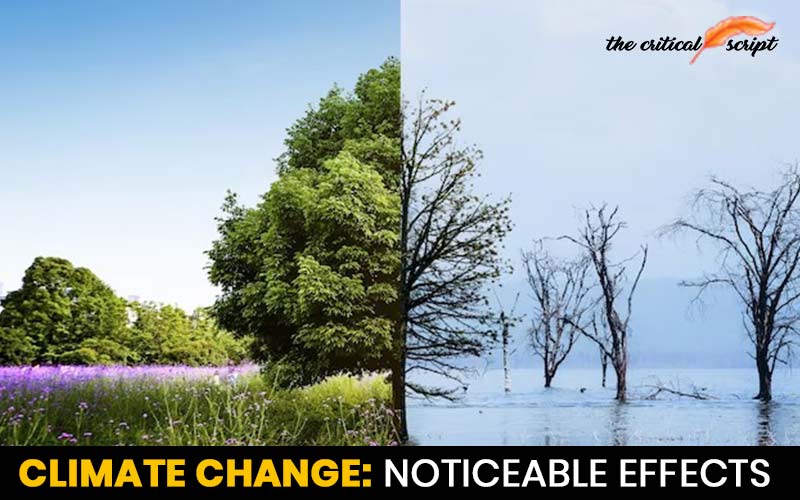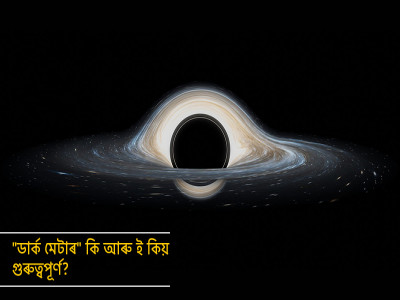
Climate Change: Noticeable Effects
The threat of climate change has quickly evolved from being a far-off concern to an actual, pressing issue. Its immediate consequences are evident across the globe, manifesting in various ways that are increasingly obvious. This blog emphasizes the urgent need for prompt and coordinated action by highlighting critical domains where the results of climate change are most noticeable.
APPARENT OUTCOMES OF CLIMATE CHANGE
WEATHER PATTERN:
The most obvious effect is the apparent change in weather patterns, which has been demonstrated by a rising percentage of hotter summers and more intense heat waves worldwide. There have been unprecedentedly high temperatures and severe discomfort as a result of these heatwaves, which have broken previous record highs in both the land and the ocean. Elevated temperatures have far-reaching effects that go beyond simple changes in the weather. These effects affect communities, ecological systems, and traditional weather patterns. There is a growing sense of urgency to address climate change as the world struggles with these environmental transformations. The negative effects are not limited to certain areas but rather have a worldwide impact, highlighting how interwoven the ecological balance of our globe is. Recognizing the urgent threat that climate change poses to our environment, civilizations, and the delicate balance of weather phenomena, it is important that we take this challenge straight away.
MELTING GLACIERS:
Another clear sign of climate change is the startling rate at which glaciers are retreating worldwide, which is another obvious consequence of climate change. The ecosystems in polar regions are experiencing a concerning decline, primarily attributed to the accelerating melting of ice. The animals that live in these areas are especially affected by this environmental issue because they have to deal with the effects of declining habitats and shifting conditions. There is a threat to the wide variety of organisms that have evolved in the hard circumstances of these extreme regions because the complex equilibrium of polar ecosystems is being disturbed. The melting of the ice not only changes the topography of the area but also makes it harder for species to survive. To lessen the negative effects on polar ecosystems and protect the distinctive biodiversity that distinguishes these fragile areas, conservation efforts and international initiatives are becoming more and more important. The effects of melting glaciers go beyond raising sea levels and endangering low-lying communities, beyond aesthetic concerns. As a result of the glaciers' unusual rate of retreat, there could and will be dangerous consequences for the planet's future if we don't take action now.
NATURAL DISASTERS:
As a direct result of climate change, we are also witnessing an increase in the frequency and intensity of natural disasters, such as those involving water, fire, habitat shifts, and other phenomena. Communities are bearing the burden of these growing environmental problems, putting residents at increased risk. One prime example is the disruption of traditional weather patterns by climate change, resulting in increased intensity of rainfall events. This intensification leads to heavier and more frequent downpours, which put stress on the infrastructure and cause flooding in areas that are already vulnerable. Beyond the immediate losses, agriculture is impacted, and managing water resources is made more difficult. Heavy rainfall has been a regular occurrence, often resulting in landslides, flash floods, and soil erosion. As a direct result of climate change, there are more extreme floods, which have disastrous effects on communities that have to deal with flooded areas and damaged infrastructure.
A wide range of natural disasters, from hurricanes to earthquakes, are affected by climate change in far-reaching ways beyond floods, making effective mitigation methods urgently necessary. Climate change has made hurricanes and storms more frequent and potent. The challenges faced by communities are further increased in coastal zones due to the combined threat of excessive rainfall and storm surges. The need for quick response is critical since the damage to infrastructure and human life caused by these extreme weather events is increasing along with their frequency and intensity.
Furthermore, climate change is influencing weather patterns in various other obvious ways. In plenty of regions now, prolonged periods of drought are becoming commonplace. The provision of water, agriculture, and the general resilience of ecosystems are all severely impacted by these extended periods of dryness. Severe wildfires are also becoming more frequent, destroying large areas of land, threatening human habitations, and causing wildfires to worsen. The severity and regularity of these incidents highlight the critical need for preventative fire management strategies.
INFLUENCE ON WILDLIFE:
Not only does climate change impact the flora and fauna, but it also modifies their behavior. Seasonal timing adjustments are indicated by these changes, which include earlier leafing and altered bird migrations. Plants and trees experiencing early leafing out due to climate change break the natural ecological cycles and have an effect on species that depend on certain seasonal signals. Similar changes in bird migration patterns are a result of climate change's effects on wildlife; the early or late arrival of spring migratory birds can have a negative impact on ecosystems and bird populations. Furthermore, species are modifying their ranges in response to changing climatic conditions, which has a domino effect on biodiversity and may put some plant and animal species in jeopardy.
In conclusion, the effects of climate change are becoming more and more noticeable in our day-to-day lives. These effects include melting ice, hotter summers and heat waves, and an increase in natural disasters. It is extremely important that individuals, organizations, and governments all take action on this issue. Beyond what scientists have predicted, the effects are evident in catastrophic weather occurrences and changes in ecosystems. To lessen these effects and preserve the health of our world for future generations, we must act collectively immediately.
(Note: Despite their similar effects, climate change and global warming are not interchangeable.)
Disclaimer: The opinions expressed in this article are those of the author's. They do not purport to reflect the opinions or views of The Critical Script or its editor.

Newsletter!!!
Subscribe to our weekly Newsletter and stay tuned.

















Related Comments